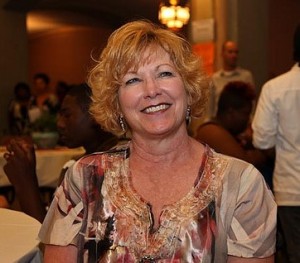GCAA: New public arts school in St. Louis spreads its wings
[Bias Warning: My 12-year old daughter happily attends the school I'm about to describe; this article might also serve as an invitation for you to learn more about Grand Center Arts Academy, especially if you have a 6th, 7th or 8th grade student in your home and you live in the St. Louis area].
About a year ago, my wife and I attended a meeting at which a calmly enthused woman named Lynne Glickert stood in front of a group of 15 families, waved her hands in the air in the process of describing a brand new art school she was trying to put together. The name of this new public school was to be Grand Center Arts Academy.
Ms. Glickert, formerly a music teacher who was to become the school's first principal, continued: The new school would start with only the 6th and 7th graders; it would add the 8th grade in the Fall of 2012 and it would continue to add a grade per year until it reached the 12th grade. It would be a public charter school, meaning that those eligible to attend (including any resident of the City of St. Louis and residents of many of the St. Louis suburbs) would do so without paying any out-of-pocket tuition. This new school would focus heavily on the arts, including theater, dance, music and visual arts. It would attract a lot of good students who were serious about the arts, she said. It would have a dedicated staff of teachers, who she was still in the process of hiring, she said. It would someday have a building of its own, though the school would initially be housed in the classrooms of a nearby Baptist Church. She urged that the arts would be taught by high quality professionals, who would accept children who had no formal training in the arts, as well as students who did have a head start. She urged that the core curriculum would be extremely important as well (Communications Arts,
Principal Lynne Glickert:  Social Studies, Math and Science). Ms. Glickert urged that in addition to everything else she promised, this school would cultivate a direction for the art produced by its students; this would also be a school that maintained a focus on "social justice."
The notable thing about this school, Ms. Glickert said, is that the students would receive at least two hours of intense art each and every day. Glickert introduced a quiet-spoken man named Dan Rubright, an accomplished musician and composer, who indicated that he would be involved in cultivating "Partnerships" with many St. Louis area arts organizations, including the St. Louis Symphony and many of the other arts organizations located in Grand Center, the Arts District of St. Louis.
[More . . . ]
Social Studies, Math and Science). Ms. Glickert urged that in addition to everything else she promised, this school would cultivate a direction for the art produced by its students; this would also be a school that maintained a focus on "social justice."
The notable thing about this school, Ms. Glickert said, is that the students would receive at least two hours of intense art each and every day. Glickert introduced a quiet-spoken man named Dan Rubright, an accomplished musician and composer, who indicated that he would be involved in cultivating "Partnerships" with many St. Louis area arts organizations, including the St. Louis Symphony and many of the other arts organizations located in Grand Center, the Arts District of St. Louis.
[More . . . ]
